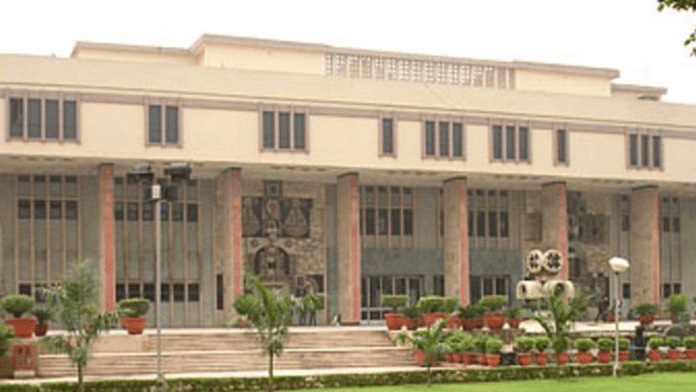New Delhi: Paving the way for the rights of orphaned children, the Delhi High Court has directed the state to frame guidelines to safeguard their property rights so as to ensure their financial security and future stability.
“Courts are zealous guardians for the protection of the properties of minors and efforts must be made to ensure that the properties are immediately secured so that they are not frittered by unscrupulous relatives, who like vultures want to prey on the meagre belongings that have been left behind for them on which only they have the rights,” Justice Subramonium Prasad ruled, emphasizing that the cases of children who are “helpless victims of circumstances” must be dealt with compassionately.
The court was acting on a plea filed on behalf of a group of orphaned boys, which stated that the properties belonging to their parents were being frittered away, leaving them with no other alternative but to invoke parents’ patriae jurisdiction to secure their interest.
The parens patriae & the plea
Parens patriae is the Latin term for “parent of the country or homeland.” Under “parens patriae”, a state or even a court has a paternal and protective role over its citizens or others subject to its jurisdiction, the Cornell Law School’s Legal Information Institute states. Notably, it is under this doctrine that all orphans are deemed worthy of special protection by the state.
The first case arose after the demise of the boys’ parents. Before the loss of their parents, the children had suffered severe abuse and neglect, following which they were placed in Child Care Institutions (CCIs). When their relatives said they wanted to meet them, the boys refused to be reunited, owing to a lack of support from them throughout.
They also argued before the court that their properties were not in their possession, and were being “frittered away”. To secure their future and ensure that no prejudice is caused to their movable and immovable assets, they approached the court, saying that they sought its assistance in their rehabilitation.
In the second case, a minor brother and sister were abused by their alcoholic father, and later, abandoned by the mother. Following a violent incident in 2020, the police arrested the father and placed the children in a CCI. Two years later, the father passed away in 2022.
The parents of both sets of children had property in Delhi and assets. Despite this, the children were left without access to these resources, and there was apprehension that their families would take control instead.
Subsequently, in 2023, iProbono India, a social justice organisation, filed two separate petitions before the HC, seeking protection of the children’s rights to their parents’ property. Due to the common question of law involved in both cases, the court clubbed and heard them together.
What court ruled
Emphasising the urgent need to protect orphaned children from exploitation, the court directed the district magistrates to immediately take steps to safeguard their property interests by filing applications before trial courts.
Upon analysing provisions of the Guardians and Wards Act, the Juvenile Justice (Care and Protection of Children) Act, and the Family Courts Act, all of which protect the rights of orphans, Justice Prasad said that there were various gaps in these laws, because of “a lack of coordination between various organs of the State” including the courts, and the executive.
To fill up such gaps, the court directed the government to frame and implement guidelines to ensure timely action of all state organs to protect the rights and welfare of such children. It also asked the Child Welfare Committee (CWC) to frame guidelines for safeguarding the property rights of orphaned children in Delhi. As a result, the draft guidelines were framed and presented in court.
What were these draft guidelines
Drafted with the assistance of senior advocate Dayan Krishnan, who was also the amicus curiae in this case, the guidelines laid down the process for stakeholders such as the CWC, the Juvenile Justice Board, the District Child Protection Unit, the police, and the District Magistrate (DM) to handle property matters of orphaned children.
Significantly, the CWC was directed to obtain the parent’s succession, death, and other certificates, within a week’s time of receiving the Social Investigation Report, which contains information on assets. After this, the documents must be sent to the DM for further action.
The government was asked to create guidelines for authorities to protect property rights of orphaned children, based on the draft guidelines included in the judgment. By way of a 37-page ruling, the HC also issued directions to other courts considering applications for the guardianship and protection of children’s properties.
What were the directions
Firstly, the application filed by the DM for guardianship over a minor child’s property should be placed before the Family Court, which is already dealing with the application of guardianship of the child to avoid conflicting directions and ensure speedy disposal of the application.
Another direction concerned family courts and how they should adopt a child-centric approach. A separate counsel on behalf of the child is to be appointed so the minor’s views are duly considered, the court said.
It also said that the family court must keep the case pending till the child attains the age of majority. “The guardian should be asked to submit yearly accounts to the concerned family court and the family court should also oversee the accounts and statements as filed by the guardian.”
The court further said that if a child is eligible for adoption, the application for protecting the child’s property should not, in any way, be allowed to hinder the process of adoption.
(Edited by Tony Rai)
Also Read: Shazia Ilmi vs Rajdeep Sardesai: Why Delhi HC slapped costs of Rs 25,000 on BJP spokesperson






